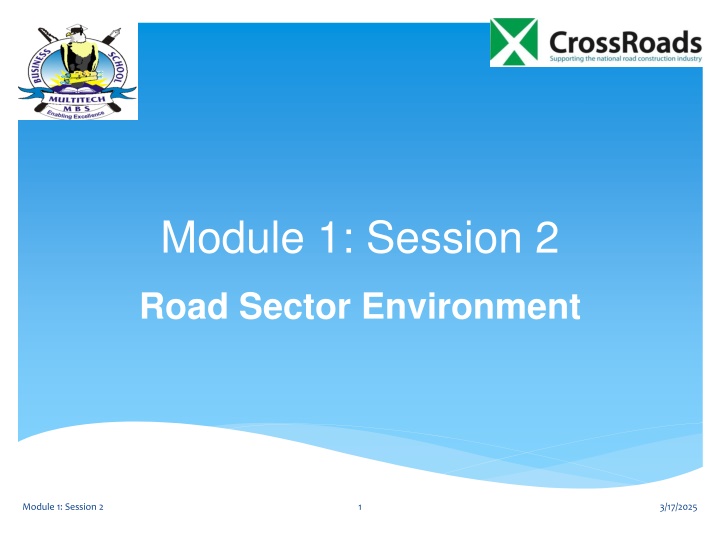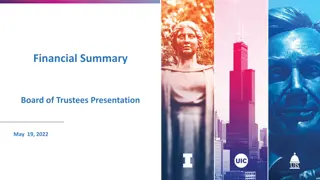
Challenges and Opportunities in Uganda's Road Sector
The road sector in Uganda plays a vital role in transportation, with the majority of passenger and freight transport relying on roads. Despite rising investments and budget allocations, challenges such as escalating construction costs, undeveloped national construction industry, low quality works, corruption, and lack of capacity hinder progress. Local contractors face barriers like small size, limited technical capacity, and prohibitive tender processes. Addressing these challenges is crucial for sustainable development in Uganda's road infrastructure.
Uploaded on | 0 Views
Download Presentation

Please find below an Image/Link to download the presentation.
The content on the website is provided AS IS for your information and personal use only. It may not be sold, licensed, or shared on other websites without obtaining consent from the author. If you encounter any issues during the download, it is possible that the publisher has removed the file from their server.
You are allowed to download the files provided on this website for personal or commercial use, subject to the condition that they are used lawfully. All files are the property of their respective owners.
The content on the website is provided AS IS for your information and personal use only. It may not be sold, licensed, or shared on other websites without obtaining consent from the author.
E N D
Presentation Transcript
Module 1: Session 2 Road Sector Environment Module 1: Session 2 1 3/17/2025
Purpose of session 1) To appreciate the role of the road sector in Socio- Economic Development 2) To identify core road construction stakeholders 3) To create awareness of overseeing agencies in the road sector 4) To outline the road construction cycles 5) To identify key challenges of the road construction sector and 6) To identify ethical issues in road construction 7) To create awareness of the National Construction Policy. Module 1: Session 2 2 3/17/2025
Road stock in Uganda Over 90% of passenger and 96.5% of freight transport is by road. Category of roads are: National roads: 20,800kms of which 3,050 kms are paved. (16,750 kms unpaved). Urban roads: 4,800kms some paved. District roads: 17,500 kms all not paved. Community roads: 35,000 all not paved. Road stock low at 39.6kms/100sqkms cf India s 111.7kms/100sqkms and South Africa s 62.1kms/100sqkms. Approximately over 70,000kms of unpaved roads. Module 1: Session 2 3 3/17/2025
Rising Investment in Roads In 2009/10, 12,258kms of district roads were targeted for routine mechanized maintenance. Increasing investment over last four years by 41% from $461m to $650m. GoU Budget allocation to roads increased by 83% during the same period, Road financing %ge by GoU grew from 55% in 2007/8 to 72% in 2011/12. 2012/13 works and transport sector budget est. shs 1,651 billion (16.8% of total budget), 3rd highest budget line next to education (17%) and energy! Module 1: Session 2 4 3/17/2025
Challenges in the road sector Cost of constructing a standard kilometer of a double bitumen road rose from $420,220 in 2007 to $1,200,000 in 2011 (2.8 times)! Escalating costs of construction are due to 5ds: a) Distance from the sea b) Depleting raw materials c) Design shortcomings d) Delayed payment e) Depreciating currency and Inadequate competition and possible collusion Undeveloped national construction industry and lack of capacity Low quality works Corruption and unethical business practices Module 1: Session 2 5 3/17/2025
Overview of the challenges to Local contractors Local contractors have failed to compete for major contracts of road works possibly because: 1) Many are small road contractors 2) Insufficient or erratic workload 3) Inadequate technical capacity 4) Small finance base 5) Inadequate business management skills 6) Limited access to equipment 7) Lack of track record of past performance 8) Lengthy prohibitive tender processes Module 1: Session 2 6 3/17/2025
Road Construction Stakeholders Government of Uganda plans and allocates resources for road sector development. Ministry of Works and Transport determines policies and oversees the entire transport sector including roads. UNRA designs, contracts, supervises road works and carries out limited emergency road construction. Uganda Road Fund allocates funds for maintenance of roads. General public that makes use of roads Central Materials Laboratory tests materials and works Funders and development partners: provide loans and grants: Consultants who design and supervise works Overseeing agencies: Module 1: Session 2 7 3/17/2025
Overseeing Road Agencies The main responsibility of overseeing agencies is to ensure transparency and accountability in road construction. PPDA monitors transparency of tendering procedures and evaluates value for money for contracts awarded, PPDA handles complaints and streamlines anomalies that arise during the procurement process. Auditor General makes annual audits and also audits contracts Inspector General of Government prosecutes those who abuse the tax payers money. Module 1: Session 2 8 3/17/2025
Overseeing Agencies continued Police carries out criminal investigations, arrests and prosecutes District Public Accountability Committees at local level deal with matters raised by Internal Audit and those of the Auditor General. Public Accountability Committees of Parliament act on matters raised by the Auditor General. Other sectorial committees e.g. on Works and Local Governance investigate and recommend appropriate action. Module 1: Session 2 9 3/17/2025
A General Road Construction Cycle Identification of the need and Design of the road by the Consultant and UNRA Identification of funds and contracting the Contractor and the Consultant Project completion and commissioning Mobilization: (developing the team, machinery and selection of subcontractors) Contract management and review (variations) Actual Site interpretation of the design, construction and supervision establishment and setting up 13 Module 1: Session 2 10 3/17/2025
Prequalification cycle Preparation of expression Invitation of expression of interest Evaluations Short listing and feedback Evaluation of expressions Invitation of bids Quantity surveying Preparation and submission of bid Bid bonds Selective tendering Module 1: Session 2 11 3/17/2025
Road works cycle Award notification and debriefing Bid validation and Performance Bond Preliminaries Award Advance payment security Equipment mobilization Site clearance Mobiliz ation Rehabilitating existing formation Construction of road formation Provision of fill materials Earth Works Drainage Gravelling Other works Certification Demobilization Defects rectification Retention payments Works completi on Module 1: Session 2 12 3/17/2025
Ethical Issues in Road Construction 1) Contamination of the soil and water sources 2) Degradation of vegetation, soil erosions 3) Careless execution of demolition and construction 4) Storage/disposal of construction waste products 5) Inadequate protection for public from debris/dust 6) Un representative samples 7) Forgery of laboratory results, fraud, bribery and dishonesty 8) Collusion 9) Conflict of Interest 10)Negligence Module 1: Session 2 13 3/17/2025
Ethical Issues in Road Construction Others include: 1) Unlawful Industrial actions by trade union bodies 2) Impropriety in Government Tendering Practices 3) The practice of under bidding to gain work 4) Poor workmanship (lack of quality control) 5) Culture of large construction companies 6) Unethical use of variations 7) Impact of political influence (State & Federal) Module 1: Session 2 14 3/17/2025
Highlights of the National Construction Policy and Strategy 1. Harmonize roles and responsibilities of the public and the private sector: Decrease involvement of public sector in service delivery and disengage from construction. 2. Regulate and coordinate the National Construction Industry: Coordinate public private sector dialogue, establish the Uganda Construction Industry Commission (UCICO) and strengthen and support the regulatory and professional bodies. 3. Develop and strengthen local capacity for effective participation Develop and strengthen local contractors, consultants, suppliers and manufactures through UNABCEC, UACE and others. Module 1: Session 2 15 3/17/2025
The Highlights of NCI Policy and Strategy 4. Increase access to equipment, credit and work by: Establishing a privately managed plant hire pool Relaxing tender terms for advance payment, performance guarantees and access to up-front financing Setting up a contributory construction guarantee fund, Increasing contracting work to local firms by mandatory sub-contracting of not less than 20% of the contract sum and at least 30% of consultancy services. Module 1: Session 2 16 3/17/2025
The Highlights of NCI Policy and Strategy 5. Promote use of new and appropriate technology by promoting use of labour-based technology and research in new technologies. 6. Remove restrictive practices to participation of marginalized groups 7. Promote sustainable economic and social development by protection of the environment, promoting occupational health and safety and providing security in insecure areas. Module 1: Session 2 17 3/17/2025
Group assignments 1) Discuss how Munaku is similar or different from a typical local contractor. 2) List the key stakeholders and their roles in the road construction sector and outline the importance of a road contractor to the country. 3) Describe the road construction cycle and suggest a likely time frame to it and the problems that it may cause to financial and business management. 4) State highlights of and discuss the extent the National Construction Industry Policy may address concerns of contractors. 5) Identify the key challenges to a road contractor and suggest how they can be addressed. Module 1: Session 2 18 3/17/2025
END Q& A Module 1: Session 2 19 3/17/2025






















